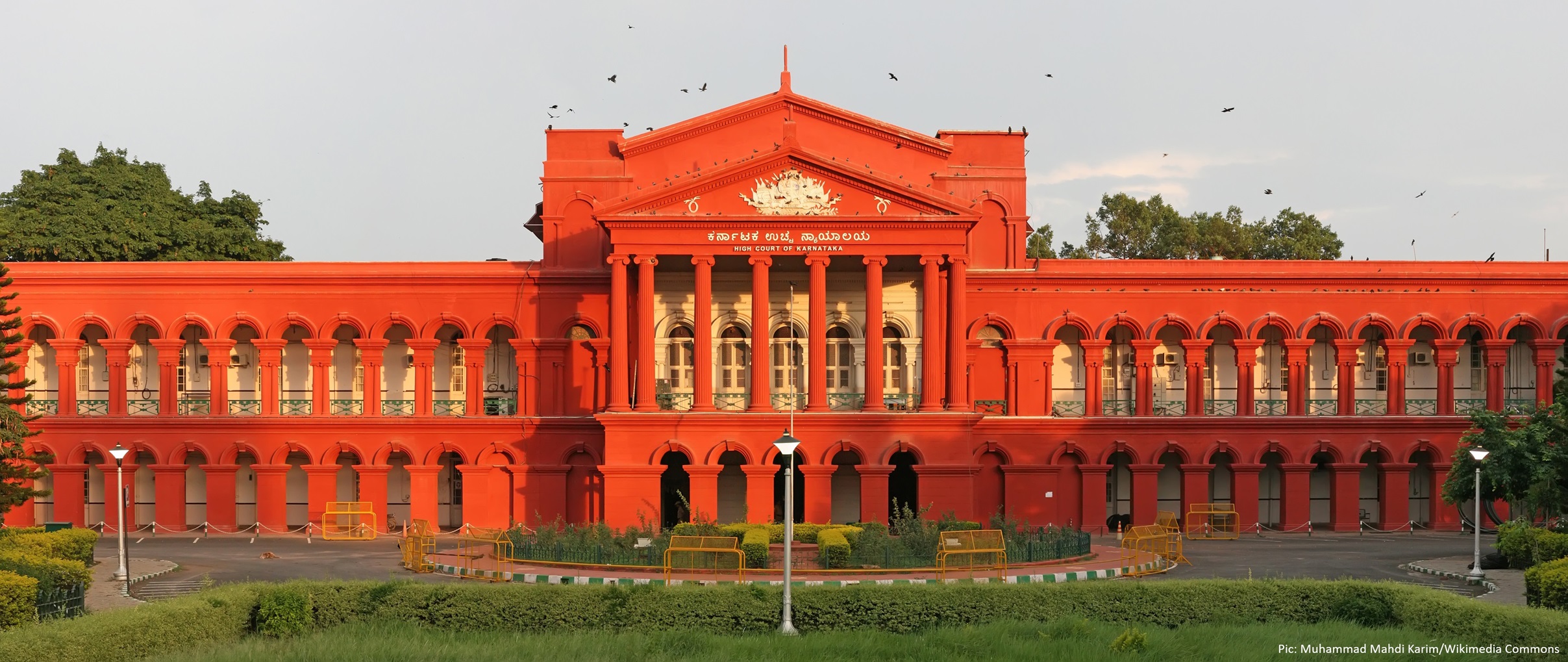The Crime in India report, published by the National Crime Records Bureau (NCRB) under the Ministry of Home Affairs, Government of India, is an extensive compilation of data on crimes registered by the Police Stations at the state and district level. The report also gives us an idea of whether the judicial system is able to deliver timely justice in the case of criminal cases by detailing convictions, acquittals, discharges and the number of persons still under trial.
The report for 2023 has been released finally after a prolonged delay and can be found here.
In the first of a two-part analysis we look at the overall data in terms of total crimes registered, people arrested, chargesheeted and convicted. The data will be analysed at the level of eight major cities in India – Ahmedabad, Bengaluru, Chennai, Delhi, Hyderabad, Kolkata, Mumbai and Pune.
In the second part we will look at specific crimes like crimes against women, children, economic offences and cyber crimes, again at the level of the eight major cities.
Delhi leads by a distance
Being the national capital as well as the most populated City/Union Territory in India, Delhi is expected to record the most number of cases. However, the number of cases registered in 2023 was miles ahead of the other cities, including Mumbai. Delhi’s 3.43 Lakh cases registered is more than the rest of the large cities combined, at 2.78L.
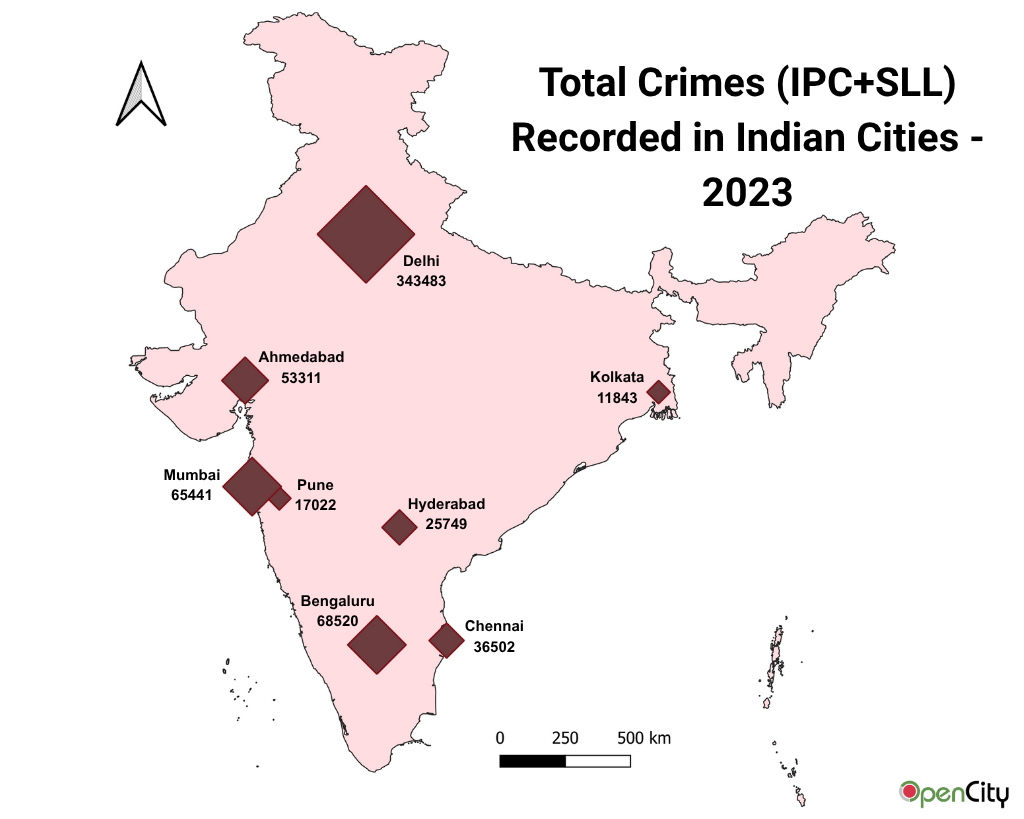
The Indian Penal Code (IPC) refers to criminal laws that apply to the entire country. It was replaced by the Bharatiya Nyaya Sanhita from July 1st 2024. The report from the next year should reflect this change.
Special and Local Laws (SLLs) refer to laws that have applicability within specific states and districts. Examples include the Lottery Prohibition Act of Tamil Nadu, the Karnataka Lokayuktha Act of 1984 and the most (in)famous, The Maharashtra Control of Organised Crime Act (MCOCA), 1999.
While IPC cases dominate in most Indian cities, the exceptions are Chennai – where more than half the cases are under SLLs, – Ahmedabad, Bengaluru and Mumbai where a large share of criminal cases were filed under SLLs.
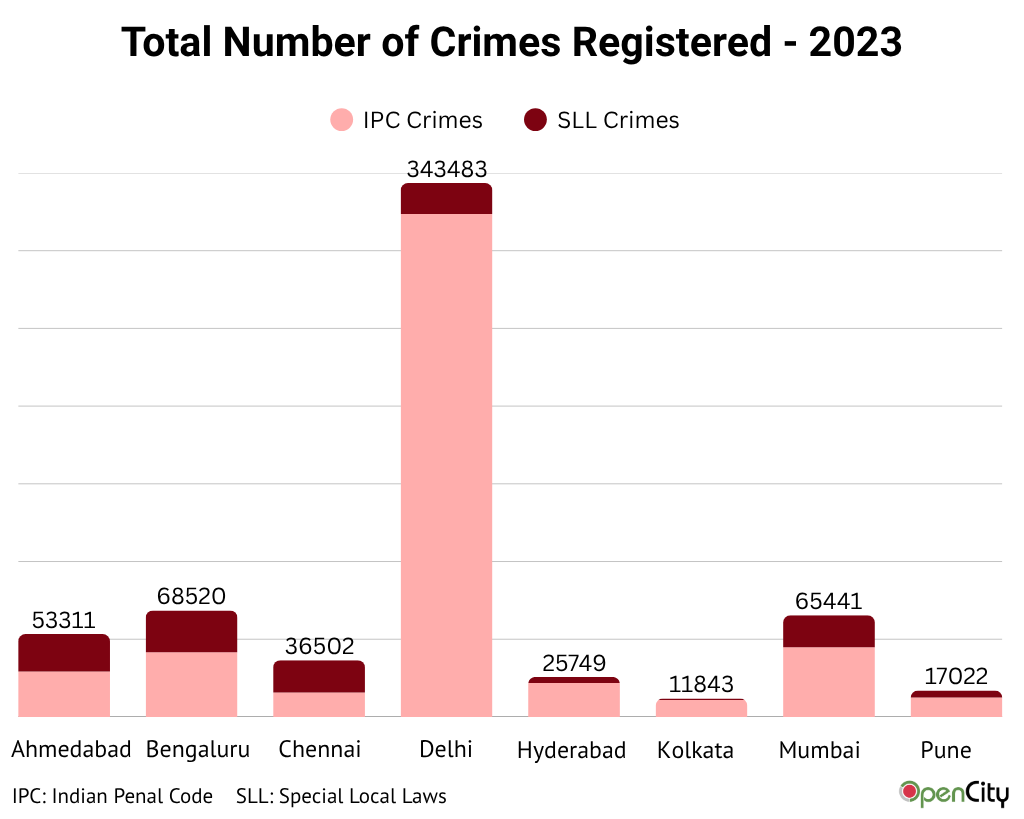
Arrests and Chargesheets
A person can be arrested without a chargesheet and held for a period of 60 to 90 days (based on the nature of the offence). A chargesheet is the formal pressing of charges and moves the case into the judicial system resulting in an eventual conviction, acquittal or disposal of the case.
A chargesheet can be filed in court without an arrest if the person accused has acquired bail, if the police believe the accused will not abscond, or the court permits filing without custody.
While the number of cases registered were high, the number of arrests and chargesheets show more parity between the cities. The number of persons arrested in Delhi was less than half the total number of cases and the number chargesheeted was only slightly more than the arrests.
The only city to buck the trend was Chennai where more than twice the number were arrested during the year than chargesheeted. The number of people arrested was also more than twice the number of cases registered, which was unique to Chennai, as in all the other cities considered the number of arrests was either less than or at most slightly more than the number of cases registered.
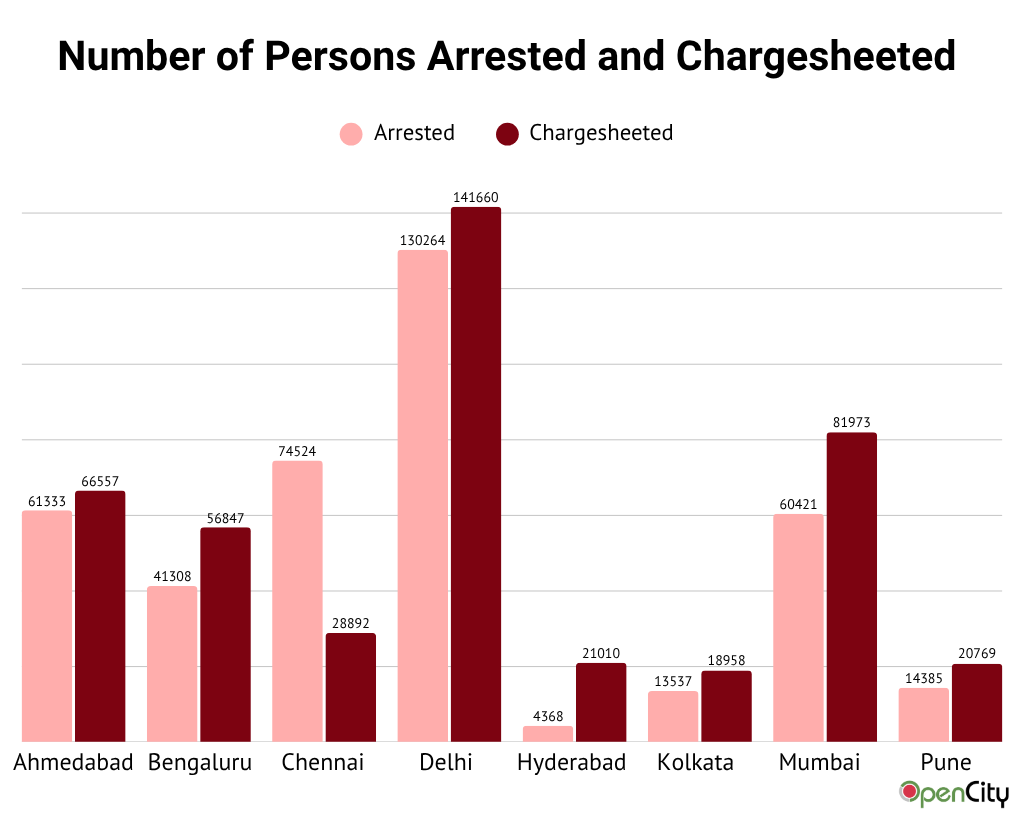
Convictions through trial
While a chargesheet brings an accused into the judicial system, it also adds to the number of persons already undergoing trial in the city’s judicial system. This number comes down only when a trial is completed and the accused is either convicted or set free.
A trial can also be disposed off at an early state, which can happen if the court does not find the case worth continuing with, or discharged later in which case the police have to come back with better evidence.
For trials that were completed in 2023, the conviction rates in cities were generally on the higher side. The outliers were Pune, where only 8.16% of the accused were found guilty, and Chennai where 85% of the accused were convicted. In general, the rest of the cities average around a 50% conviction rate.
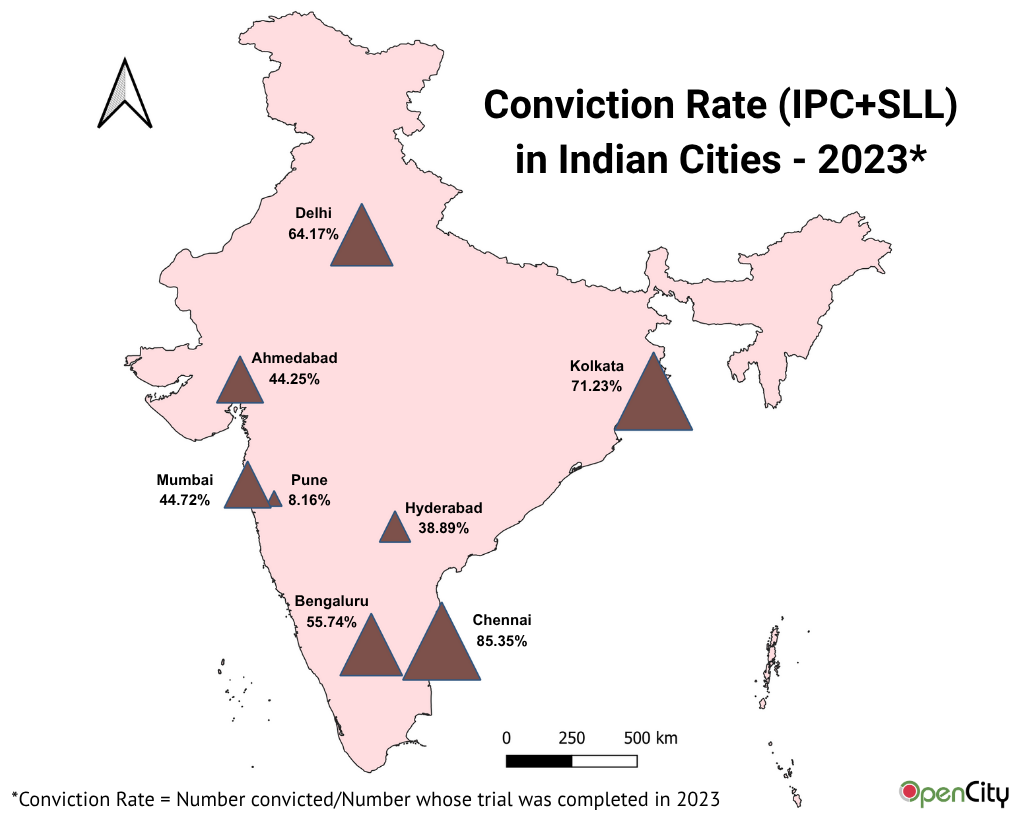
The vast difference between some cities, like Chennai and Pune can be seen in the cases that were prosecuted in court. In the case of most cities, trials under SLLs were more likely to end in conviction than IPC crimes. Only in Pune, the trend is reversed which also probably explains the low conviction rate.
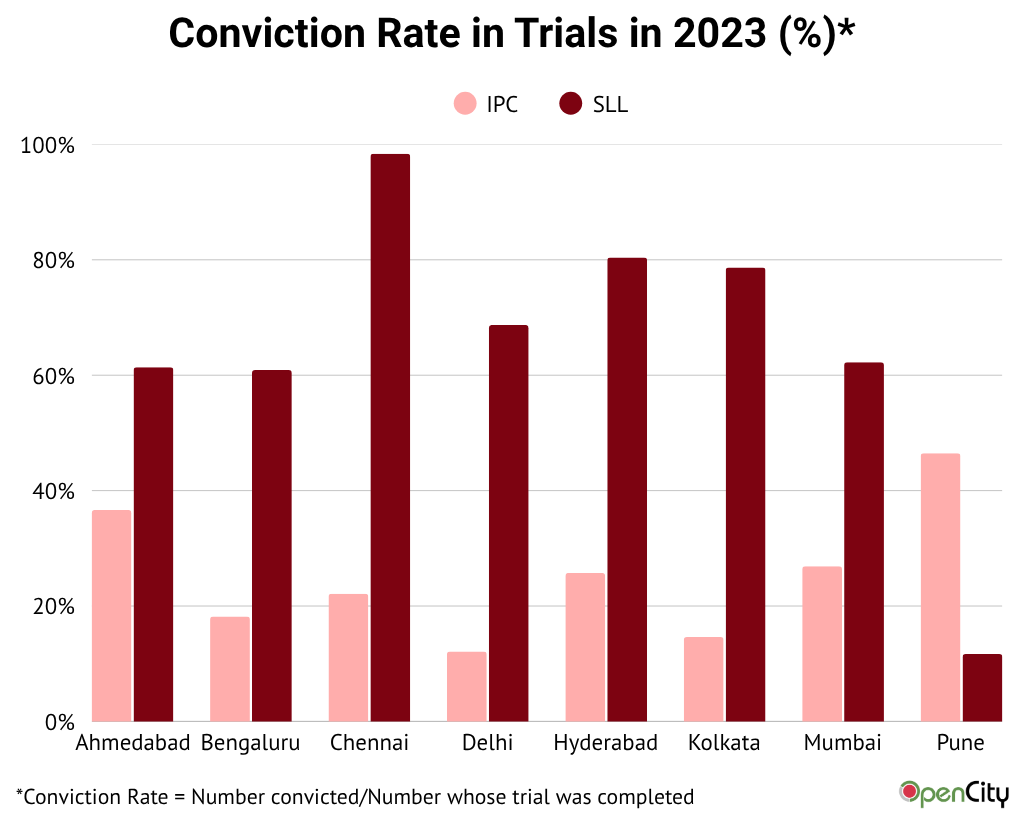
In 2023, far more cases completed trial in Ahmedabad than in any other city, and most of them ended without a conviction. This was followed by Delhi where most cases ended with a conviction. The number was extremely low in Pune and Kolkata which raises questions about the low and high conviction rates respectively in these cities.
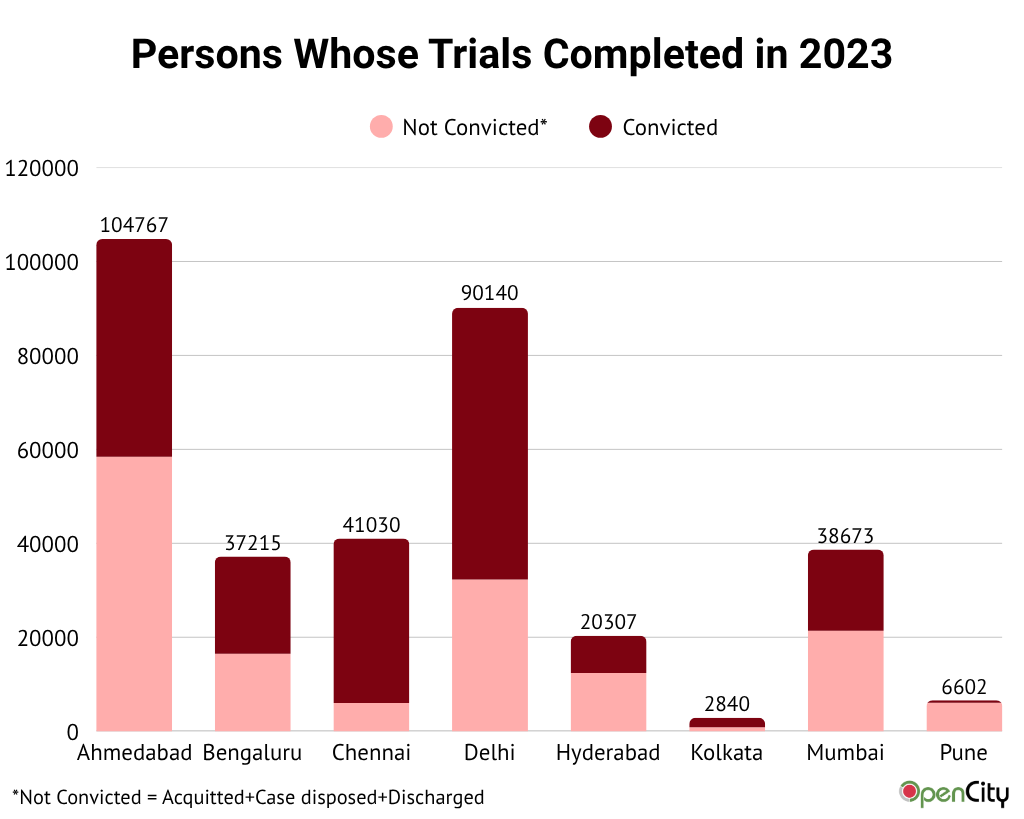
A couple of notes on the trials data:
- This data is about trials that got completed in 2023, not necessarily for cases that were registered in 2023. In most cases these would be cases that were registered in earlier years.
- Just because a trial has ended, does not mean an appeal was not registered in a higher court. The data here is just the end of the process with at least a session court for the individual cases filed at the police stations.
Overwhelmed judicial systems
The large variance in the number of cases handled by the judiciary raises a crucial question: what does the data say about the backlog for criminal cases in the courts in our cities?
Except in the case of Ahmedabad and Chennai, the number of persons facing trial at the end of 2023 was more than the number at the start. However, in cities like Chennai, Hyderabad and Kolkata, this backlog is much smaller than in Ahmedabad, Delhi, Mumbai and Pune. These former cities are handling fewer cases than the latter ones, but are still not able to clear up the backlog. Pune’s case is most worrying as the number of trials completed during the year was lower than the other cities, but the backlog is significantly bigger.
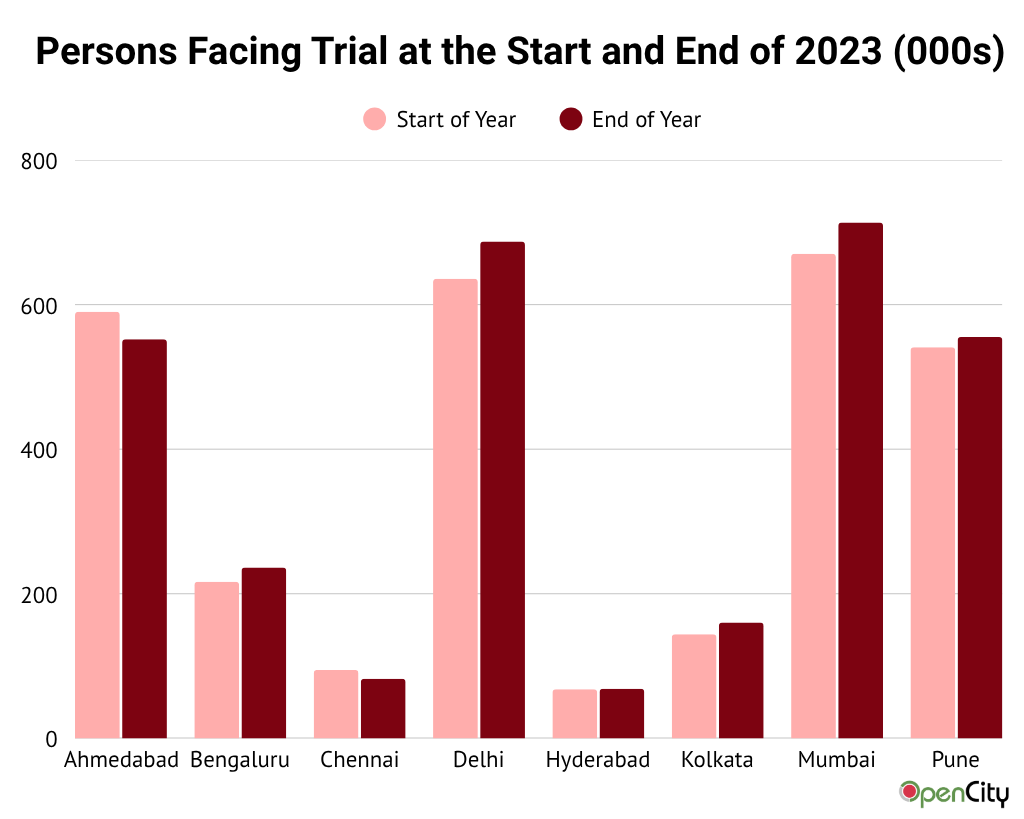
While Ahmedabad and Chennai were able to reduce the number of people facing trials, the number grew in the other cities, with a more than 10% growth in Kolkata, followed by Bengaluru and Delhi.
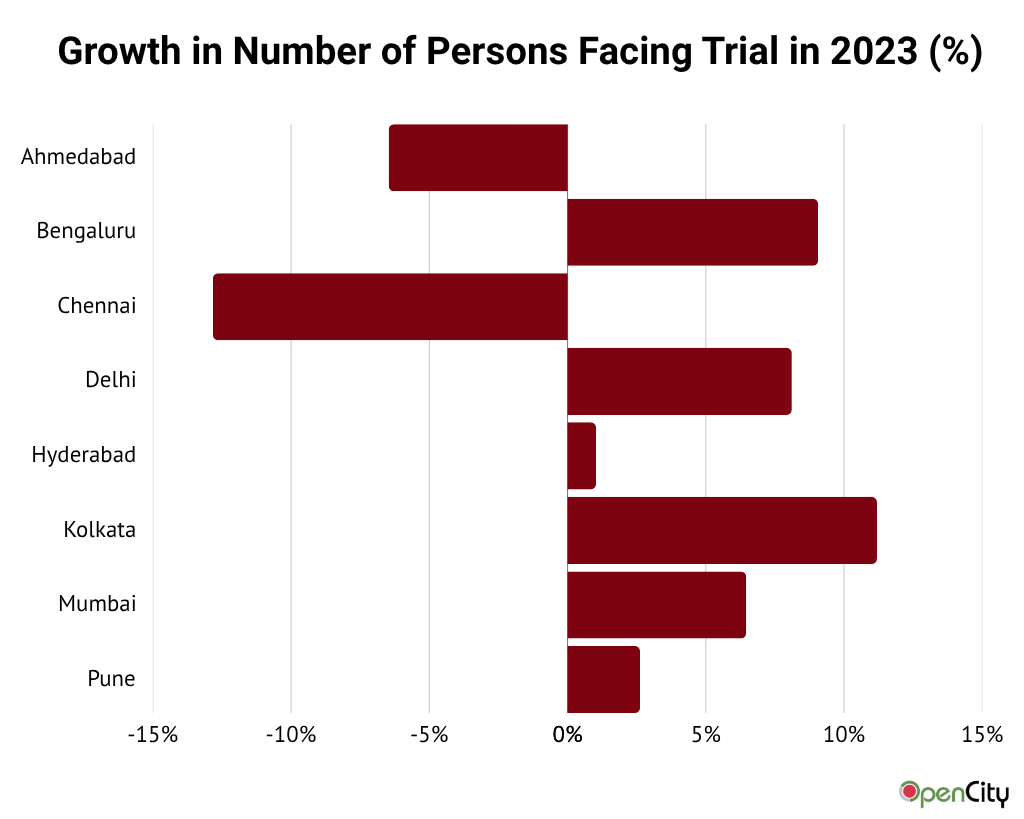
Conclusion
The criminal justice system is a slow moving machine taking years to deliver on any form of justice. However, the Crime in India report for 2023 shows that even there, there is wide variance among the cities.
While Delhi leads with the most cases filed, more than the rest of the large metros combined, in terms of conviction it is Chennai that leads. Special and Local Laws, which are often misused also muddy the picture with some cities seeing a heavier invocation of such laws than others.
Conviction rates vary widely from a paltry 8% in Pune to 85% in Chennai, and the number of cases that finished trial also varies between 2000 odd in Kolkata to more than a lakh in Ahmedabad courts.
Despite the variance in the number of trials, except for Ahmedabad and Chennai, in all the other cities the number of people awaiting justice and completion of trials only increased over the year.
The backlog in the system also varies. While Chennai and Hyderabad have backlogs of under a lakh persons, it balloons to close to 7 lakhs and over in the case of Delhi and Mumbai. Ahmedabad and Pune are only marginally behind.
The current turnover rates in our cities seem inadequate to manage the large backlogs. Unless urgent measures are taken people will continue to suffer from the slow churning of the system. Justice delayed is justice denied.

